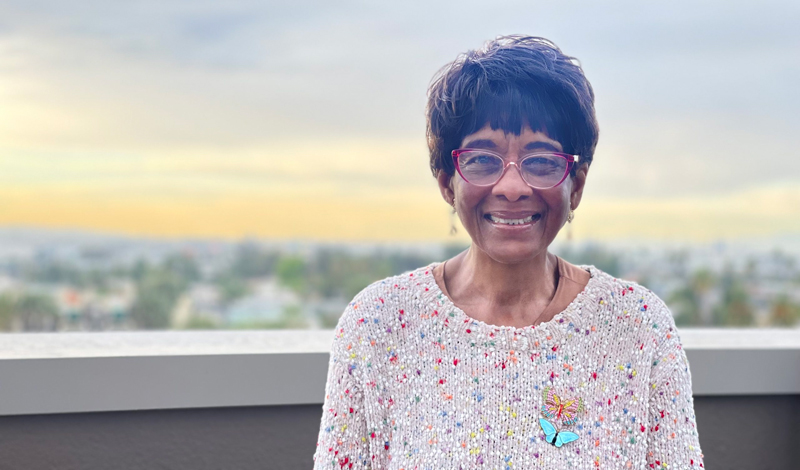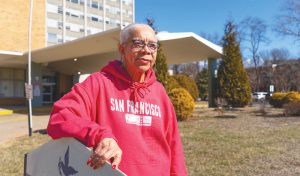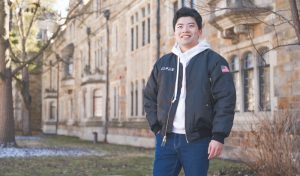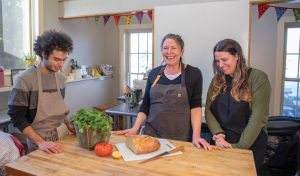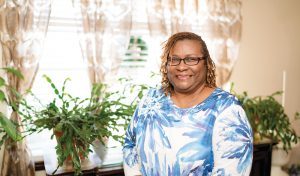by Tobie Marsh
Long Beach, Calif.

Tobie and her mother, Gerry, at the SGI-USA East Bay Buddhist Center, Richmond, Calif., May 2019. Photo by Nanci Andrade.
I still fondly remember my mother, on the last ferry back from a Catalina Island jazz festival, summer of 2000, spotting a young Kim Waters, lead saxophonist of the opening band, and calling, “Hey, Kim Waters!” And how he ambled over to talk and laugh with her through the hour-long crossing of the channel, and across the other, larger gulf of years between them—he in his late 20s, my mother in her early 70s. It didn’t matter. She had this openness, this easy radiance that welcomed people—anyone, really—into instant friendship.
My own friendship with my mother has been deep and abiding. She has been my everything: best friend, confidant, soulmate. So when my mother received an Alzheimer’s diagnosis in 2012, I got my affairs promptly in order, retired early and moved in as her full-time caregiver. For the eight years that followed, the last of my mother’s life, wherever I went, she went, too. Just as she had embraced others all her life, so she was, too, by our SGI family. To our care she responded, “Thank you, thank you.” She chanted Nam-myoho-renge-kyo with me every day until 2018, when the Alzheimer’s took away her ability to speak. “That’s OK, Mom!” I would assure her. “I’ll chant for us both!”
The loss of my mother in September 2020 rocked my world as it hadn’t been since I’d joined the SGI nearly 50 years earlier. I’d begun my Buddhist practice in my early 20s, under the cloud of another great loss—that of my grandmother. At my first Buddhist meeting, a young woman informed me with conviction: “We can chant for the deceased!” The idea felt good to me. As I chanted for my grandmother’s happiness, I felt for the first time since her passing the burden of her loss lift from my shoulders.
Now, as then, daimoku became my lifeline. There were times I felt, If Mom isn’t here, I don’t want to be, either. So began my campaign of “life or death” daimoku to muster the will to live without her. There were moments when, pressing my mother’s photograph to my heart, I wept so uncontrollably that I thought I would faint. Between tears, I found comfort in Ikeda Sensei’s encouragement. Daily, I read the following sentence from The New Human Revolution, vol. 30, describing a pioneer’s determination to remain undefeated: “She kept everything in her heart and, when suffering, went to the Gohonzon and chanted in earnest” (p. 432).
As I chanted and studied, I began to feel I needed to do more than sit and chant all day. I had to take action to move beyond this all-consuming grief.
I’ve always loved sharing my Buddhist practice with family, friends—people I know. I was uncomfortable, however, talking with strangers. I had inherited my mother’s kindness but not her easy openness; my kindness tends to be a little guarded, a little careful. It takes me time to feel comfortable with someone new. But Buddhism is no solitary practice—I realized I couldn’t move through something of this size on my own, cooped up in my apartment. Encouraged by the stories of my Soka sisters, I began “planting seeds” regularly on walks or errands, awkwardly at first but soon with greater confidence. Indeed, confidence, warmth, openness—trademarks of my mother’s behavior—were the very qualities I had to muster to speak with new acquaintances about Buddhism. As I did so, something beautiful happened.
As mentioned, my mother lost her faculty of speech three years before her passing. How remarkable, then, and how surprising, to hear her voice, after so many years, in mine. People have often remarked that my mother and I sound alike. As I opened up to others in my mother’s spirit, however, I myself was struck by the emerging similarity. Of course, it was me talking, but then there she was, too, and our words joined in harmony, in a kind of duet—my mother and me.
In these conversations, I would find a moment to discuss my practice of chanting Nam-myoho-renge-kyo, the practice that was helping me move through my mother’s death. It might seem like a lot to drop on another person in passing, but no one was put off, probably because of my evident joy in discussing Buddhism. Moreover, I found no shortage of people dealing with similar losses. A young woman at my local copy shop, mourning the death of her mother, promised to be in touch; an older gentleman I met on the steps leading down to the beach had lost both parents earlier in the year; and a college girlfriend I hadn’t seen in a quarter century, in town for her mother’s wake, spent a whole day with me, talking, laughing, opening up. And each person, receiving the gift of Nam-myoho-renge-kyo, responded with deep appreciation, commonly with the very words most often on my mother’s lips in her last years: “Thank you, thank you.”
Sharing Nam-myoho-renge-kyo with my mother’s generosity of spirit, I honor her in the most vital way I know how and discover her spirit, time and again, bowing from my heart, celebrating the Buddha nature in all people.
Q: What advice would you give the youth?
Tobie Marsh: In youth, the future seems so uncertain. Now more than ever, it is. Young people, we’re counting on you. I bow to you, and I thank you. Don’t miss out! Put this Buddhism to the test—I guarantee your future will be bright!
You are reading {{ meterCount }} of {{ meterMax }} free premium articles

